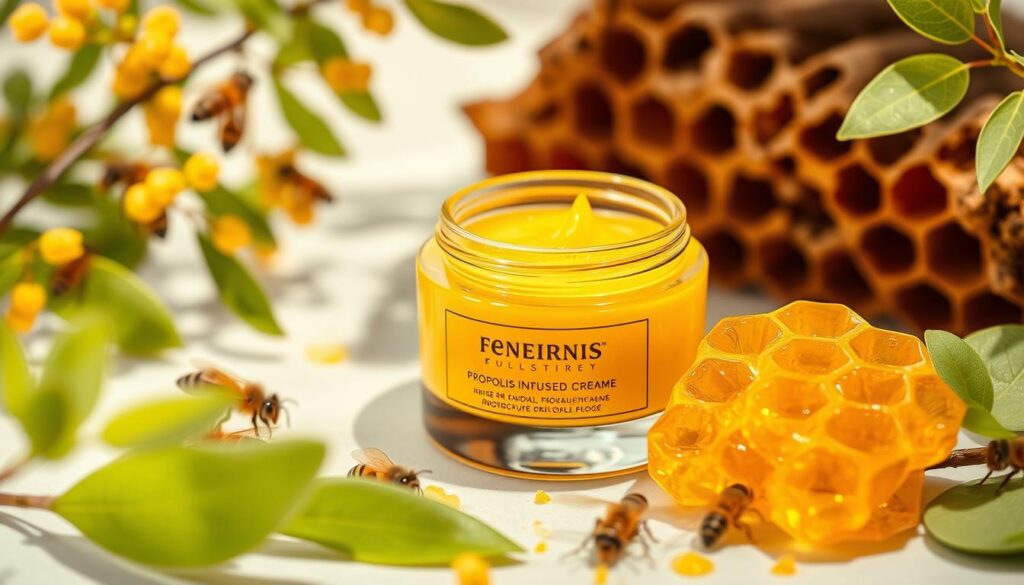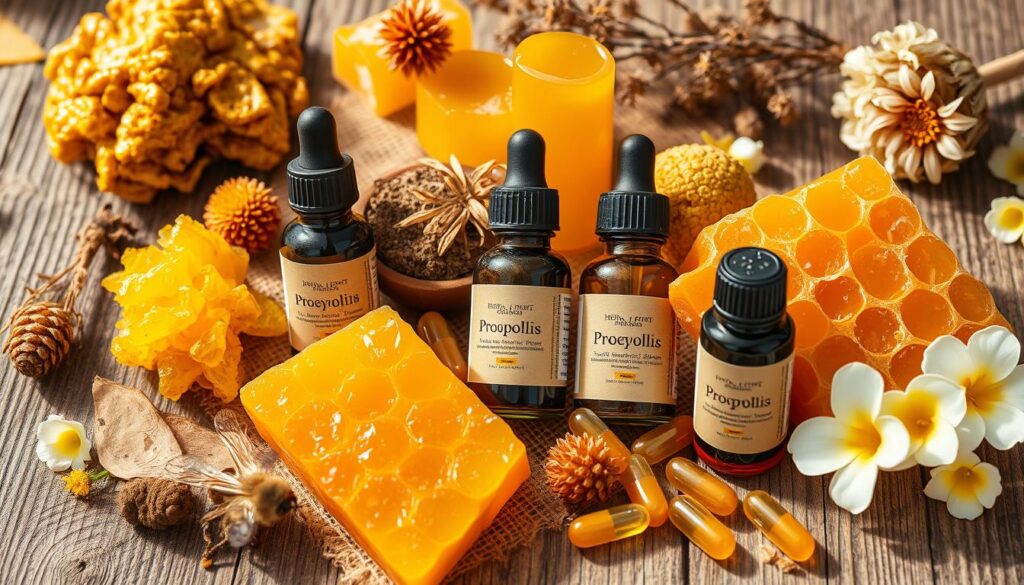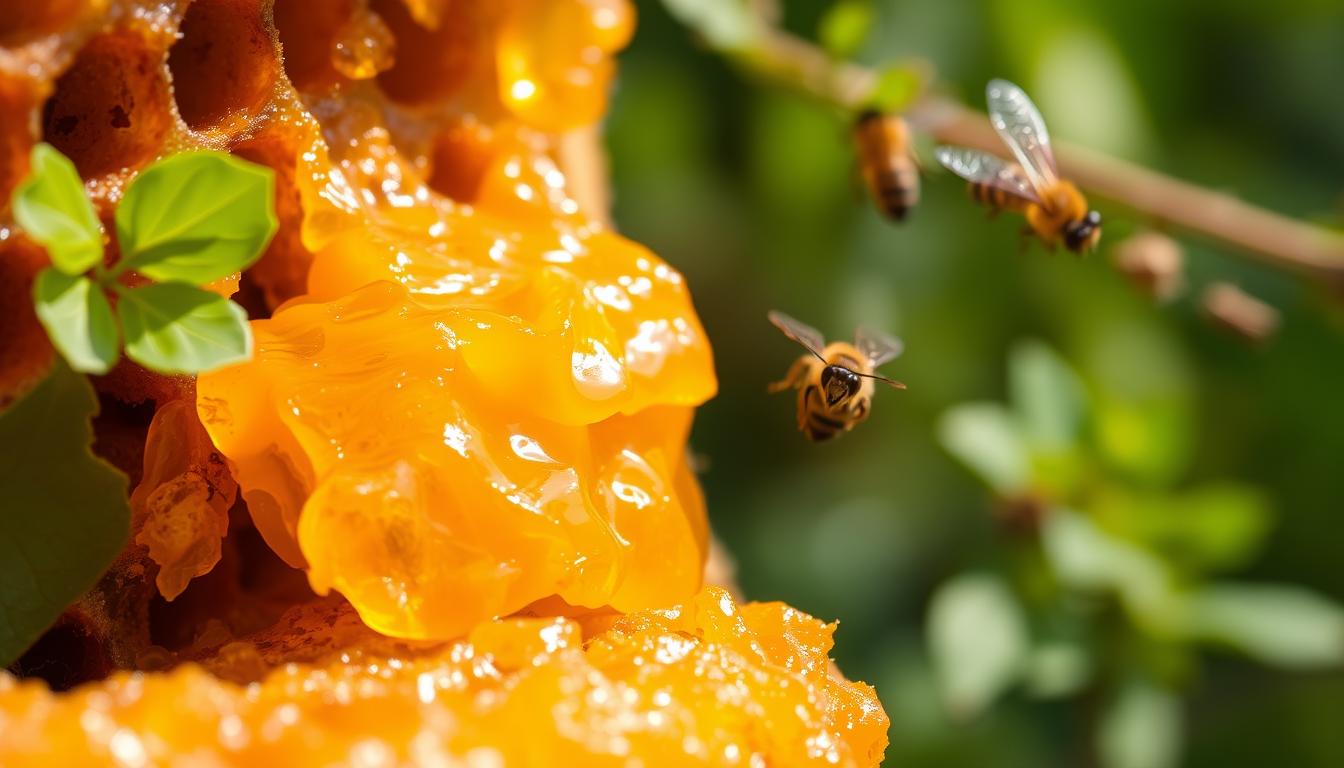Propolis, a remarkable bee-derived substance, has captivated the attention of natural health enthusiasts and researchers alike. This ancient remedy, prized for its potent antimicrobial, antioxidant, and immune-boosting properties, has withstood the test of time, emerging as a powerful ally in our quest for optimal well-being. But have you ever wondered what truly makes propolis so extraordinary? What hidden secrets does this natural wonder hold, and how can it transform our lives?
Key Takeaways
- Propolis is a resinous substance produced by bees to protect their hives from pathogens and environmental stressors.
- It is rich in bioactive compounds, including flavonoids, phenolic acids, and terpenes, which contribute to its remarkable health benefits.
- Propolis possesses powerful antimicrobial, anti-inflammatory, and antioxidant properties, making it a versatile natural remedy.
- Propolis has been used for centuries in traditional medicine to support immune function, promote wound healing, and protect against various ailments.
- Incorporating propolis into your daily routine can provide a natural boost to your overall health and well-being.
What is Propolis?
Propolis, often referred to as “bee glue,” is a sticky, resinous substance that honeybees collect from various plant sources, including tree buds, sap flows, and leaf buds. Bees use propolis to seal and protect their hives, creating a barrier against invaders and maintaining a clean, sterile environment.
Understanding the Origins of Propolis
The composition of propolis varies depending on the geographic location and the specific plant sources available to the honeybees. Bees gather the raw materials from their surrounding environment and then process them within the hive, transforming the collected resins, waxes, and essential oils into the unique propolis mixture.
Composition and Properties of Propolis
Propolis is a complex mixture of compounds, including resins, waxes, essential oils, and other bioactive substances. The specific chemical composition of propolis can differ based on the plant sources and the region where it is collected. However, propolis is known for its remarkable antimicrobial, antioxidant, and anti-inflammatory properties, making it a versatile natural remedy with a long history of use in traditional medicine.
| Propolis Component | Percentage Range |
|---|---|
| Resins and Balsams | 50-70% |
| Waxes | 10-30% |
| Essential Oils | 5-10% |
| Pollen | 5% |
| Other Compounds | 5-10% |
“Propolis is a unique and versatile natural product with a wide range of potential health benefits, making it a valuable addition to traditional and modern medicine.”
Propolis: A Powerful Natural Remedy
Propolis, a resinous substance produced by honeybees, has been used for centuries in traditional medicine across the globe. This remarkable natural compound is now gaining widespread recognition for its potent therapeutic properties, making it a compelling alternative to synthetic medications.
Historically, propolis has been employed in various cultural and medicinal practices, from ancient Egypt to traditional Chinese medicine. Its antimicrobial, anti-inflammatory, and antioxidant capabilities have been the subject of extensive research, revealing its versatility as a propolis natural remedy.
One of the key attributes of propolis is its ability to combat a wide range of microorganisms, including bacteria, fungi, and viruses. This makes it a valuable tool in supporting the body’s natural defenses and promoting overall wellness. Furthermore, propolis has demonstrated potent anti-inflammatory properties, making it a potential natural alternative for pain management and reducing swelling.
“Propolis is a truly remarkable natural substance, with a rich history of use in traditional medicine and a growing body of scientific evidence supporting its therapeutic benefits.”
Beyond its medicinal applications, propolis has also gained attention in the field of computational linguistics, where researchers are exploring its potential in text mining and sentiment analysis for information extraction. The complex chemical composition of propolis offers insights into the interplay between natural compounds and their impact on biological systems.
As the interest in natural remedies continues to rise, propolis stands out as a promising solution that harnesses the power of nature to address a wide range of health concerns. Its versatility and proven efficacy make it a valuable addition to the arsenal of natural therapies available to individuals seeking a more holistic approach to their well-being.
Health Benefits of Propolis
Propolis is renowned for its impressive array of health benefits, stemming from its antimicrobial and antioxidant properties. Studies have shown that propolis can effectively inhibit the growth of various bacteria, fungi, and viruses, making it a valuable natural defense against infections.
Antimicrobial and Antioxidant Properties
The antimicrobial properties of propolis are particularly impressive. Its complex chemical composition, which includes flavonoids, phenolic compounds, and various other bioactive substances, enables propolis to disrupt the cell membranes of pathogens, interfere with their metabolic processes, and even inhibit the production of toxins. This makes propolis a powerful tool in the fight against a wide range of infectious agents.
In addition to its antimicrobial effects, propolis is also a potent antioxidant. The antioxidant compounds in propolis, such as polyphenols, help neutralize harmful free radicals, reducing oxidative stress and supporting overall cellular health. By scavenging these reactive species, propolis can protect cells from damage and support the body’s natural healing processes.
- Effective against a wide range of bacteria, fungi, and viruses
- Disrupts the cell membranes and metabolic processes of pathogens
- Neutralizes harmful free radicals and reduces oxidative stress
- Supports the body’s natural healing and immune response
The synergistic effects of propolis antimicrobial and antioxidant properties make it a valuable natural remedy with a wide range of potential health benefits. As researchers continue to explore the therapeutic applications of this remarkable substance, the true extent of propolis’s capabilities may continue to be unveiled.
“Propolis is a remarkable natural substance with a complex chemical composition, and its antimicrobial and antioxidant properties hold great promise for supporting overall health and well-being.”
Propolis for Skin Health
Propolis, the resinous substance produced by bees, is not only beneficial for internal health but also holds remarkable potential for skin care. Its antimicrobial and anti-inflammatory properties make it an effective natural treatment for various skin conditions, including acne, eczema, and wound healing. Propolis-based skincare products have gained popularity for their ability to nourish, protect, and revitalize the skin.
The antimicrobial properties of propolis make it a powerful ally in combating acne. Propolis helps to reduce inflammation and inhibit the growth of acne-causing bacteria, leading to clearer, healthier-looking skin. Additionally, its antioxidant capabilities can help to neutralize free radicals that contribute to skin aging and blemishes.
For individuals struggling with eczema, propolis can be a game-changer. Its anti-inflammatory effects can soothe irritated skin, alleviate itchiness, and promote healing. Propolis-infused skincare products can help to restore the skin’s natural barrier, providing much-needed relief and improving the overall appearance of eczema-affected areas.
Beyond its medicinal applications, propolis also holds promise in the realm of wound healing. Its ability to inhibit microbial growth and stimulate the regeneration of skin cells can accelerate the healing process, reducing the risk of infection and scarring. Propolis-based skincare formulations can be particularly beneficial for individuals with minor cuts, burns, or other skin injuries.
Incorporating propolis into your daily skincare routine can provide a natural, holistic approach to maintaining healthy, radiant skin. Whether you’re seeking to address specific skin concerns or simply want to nurture your overall skin health, propolis offers a versatile and effective solution.
“Propolis has been used for centuries in traditional medicine for its remarkable skin-healing properties. Its natural, non-toxic composition makes it an increasingly popular choice for those seeking natural skincare solutions.”
| Skin Condition | How Propolis Helps |
|---|---|
| Acne | Antimicrobial and anti-inflammatory properties help reduce breakouts and inflammation |
| Eczema | Anti-inflammatory effects soothe irritated skin and promote healing |
| Wound Healing | Inhibits microbial growth and stimulates skin cell regeneration for faster healing |

Propolis and Immune System Support
Propolis, the remarkable resinous substance produced by bees, has long been revered for its exceptional ability to support and strengthen the human immune system. Its unique composition, rich in antioxidants and bioactive compounds, helps stimulate the body’s natural defenses against harmful pathogens, making it a valuable natural immune system booster.
Boosting Immunity Naturally
The key to propolis’ immune-boosting properties lies in its diverse array of beneficial compounds. Propolis is teeming with flavonoids, phenolic acids, and other potent antioxidants that work together to enhance the body’s natural defense mechanisms. These powerful substances help to neutralize free radicals, reduce inflammation, and support the proper function of the immune cells, all of which contribute to a stronger, more resilient immune system.
Numerous studies have demonstrated the propolis’ ability to propolis immune system support, with research suggesting that it can help increase the production of white blood cells, enhance the activity of natural killer cells, and promote the proper functioning of the lymphatic system. By harnessing the innate power of propolis, individuals can propolis immunity booster and enjoy the benefits of natural immune system support in a holistic and sustainable way.
“Propolis has been shown to possess remarkable immunomodulatory properties, making it a valuable natural supplement for those seeking to propolis immune system support.”
Whether taken in the form of supplements, tinctures, or incorporated into one’s daily routine, propolis offers a natural and effective way to propolis immunity booster and support overall well-being. By leveraging the power of this remarkable bee-derived substance, individuals can take proactive steps towards a stronger, more resilient immune system, primed to face the challenges of the modern world.
Incorporating Propolis into Your Daily Routine
Propolis, the natural resin produced by bees, can be easily incorporated into your daily routine through a variety of supplemental forms. Whether you prefer the convenience of capsules, the versatility of tinctures, or the targeted application of topical ointments, there is a propolis product to suit your needs and preferences.
Diverse Forms of Propolis Supplements
Propolis supplements come in a range of forms, each with its own unique benefits and applications. Explore the following options to find the propolis routine that works best for you:
- Propolis Capsules: These convenient, easy-to-take supplements allow you to incorporate propolis into your daily health regimen seamlessly.
- Propolis Tinctures: Liquid tinctures offer a flexible way to consume propolis, allowing you to customize your dosage and add it to beverages or food.
- Propolis Topicals: Ointments and creams infused with propolis can be applied directly to the skin, targeting specific areas with the natural benefits of this remarkable substance.
| Propolis Supplement Form | Advantages | Ideal for |
|---|---|---|
| Capsules | Convenient, consistent dosage | Daily health maintenance |
| Tinctures | Flexible, customizable dosage, easy to mix into drinks | Targeted supplementation, immune support |
| Topicals | Localized application, skin health benefits | Skin concerns, wound care |
By exploring the diverse range of propolis supplements, you can seamlessly incorporate this natural remedy into your daily routine and experience its full spectrum of health benefits.

“Propolis is a versatile natural compound that can be easily integrated into one’s daily life in a variety of ways. From capsules to tinctures, the options are endless for those seeking to harness the power of this remarkable substance.”
Potential Side Effects and Precautions
While propolis is generally considered a safe and natural remedy, it’s essential to be aware of potential side effects and precautions. Propolis, derived from the resinous substance collected by bees, may cause allergic reactions in some individuals, particularly those with sensitivities to bee products or other plant-based compounds.
It’s important to exercise caution when using propolis, especially for the first time, to ensure it doesn’t trigger any adverse reactions. Some individuals may experience mild skin irritation, redness, or itching after topical application. In rare cases, more severe reactions, such as difficulty breathing or swelling, may occur.
Additionally, propolis may interact with certain medications, such as blood thinners, immunosuppressants, and cancer treatments. Individuals taking prescription or over-the-counter medications should consult their healthcare provider before incorporating propolis into their routine.
Propolis Precautions
- Perform a patch test before using propolis to check for any allergic reactions.
- Avoid propolis if you have a known allergy to bee products or other plant-based compounds.
- Consult your healthcare provider if you are taking any medications, as propolis may interact with certain drugs.
- Use caution when taking propolis supplements, as they may not be regulated for safety and quality.
- Keep propolis products out of reach of children to prevent accidental ingestion.
By being mindful of the potential side effects and precautions, you can safely incorporate propolis into your natural wellness routine and enjoy its powerful benefits while minimizing any risks.
| Potential Side Effects | Precautions |
|---|---|
| – Allergic reactions (skin irritation, redness, itching) – Difficulty breathing – Swelling |
– Perform a patch test before use – Avoid if you have allergies to bee products or plant-based compounds – Consult your healthcare provider if taking medications – Use caution with propolis supplements – Keep out of reach of children |
Propolis in Traditional Medicine
Propolis, a natural resinous substance produced by honeybees, has long been revered for its medicinal properties in traditional healing practices around the world. This golden-hued compound, often referred to as “nature’s remedy,” has a rich history that transcends cultures and continents, showcasing its enduring significance as a versatile and effective natural medicine.
Historical Uses and Cultural Significance
The use of propolis in traditional medicine can be traced back thousands of years, with evidence of its application in ancient civilizations such as Egypt, Greece, and China. In these bygone eras, propolis was widely used for its antimicrobial, anti-inflammatory, and wound-healing properties. It was often incorporated into various topical ointments, tinctures, and elixirs to address a wide range of ailments, from skin infections to respiratory issues.
Moreover, propolis holds deep cultural significance in many traditions, serving as a symbol of vitality, purity, and the harmonious relationship between humans and the natural world. In some cultures, propolis was even revered for its spiritual and mystical properties, with its use in rituals and ceremonies aimed at promoting health, prosperity, and balance.
“Propolis has been used in traditional medicine for thousands of years, reflecting its enduring value as a natural remedy with diverse applications.”
Today, the traditional uses of propolis continue to inform modern scientific research, as researchers delve deeper into the complex chemical composition and therapeutic potentials of this remarkable bee-derived substance. By uncovering the historical context and cultural significance of propolis, we gain a richer understanding of its role in the evolution of natural medicine and its ongoing relevance in the pursuit of holistic health and wellness.
| Traditional Uses of Propolis | Cultural Significance |
|---|---|
|
|
Sustainable Harvesting and Ethical Sourcing
As the demand for natural remedies like propolis continues to grow, it’s crucial to ensure that the harvesting and sourcing of this valuable substance is done in a sustainable and ethical manner. Responsible practices are essential to protect the delicate ecosystem of honeybees and maintain the long-term viability of propolis as a natural resource.
One of the key aspects of sustainable propolis harvesting is the careful consideration of the bees’ wellbeing. Bee colonies play a vital role in the pollination of plants and the overall health of the environment. Harvesting propolis should be done in a way that minimizes disruption to the bees’ activities and preserves their hives.
Ethical propolis sourcing also involves transparency and fair trade practices. Consumers should seek out products that are sourced from reputable suppliers who prioritize the welfare of beekeepers and ensure that the harvesting process is conducted in an environmentally responsible manner.
Advances in text mining and information extraction techniques can help consumers identify propolis products that align with their values. By analyzing the sourcing and production details of propolis supplements, these tools can provide valuable insights into the sustainable and ethical practices behind the products.
“Sustainable and ethical propolis sourcing is not just a responsibility, but an investment in the future of our planet and the wellbeing of the bees that make this natural wonder possible.”
As the popularity of propolis continues to grow, it’s up to both producers and consumers to champion sustainable and ethical practices. By making informed choices and supporting responsible propolis sourcing, we can ensure that this remarkable natural resource can be enjoyed for generations to come.
Conclusion
In conclusion, propolis, the remarkable bee-derived substance, offers a wealth of benefits for overall health and well-being. From its potent antimicrobial and antioxidant properties to its ability to support the immune system, propolis has proven to be a versatile and valuable natural remedy. By understanding the origins, composition, and therapeutic applications of propolis, readers can incorporate this remarkable substance into their daily lives and experience the transformative power of nature’s remedy.
The diverse range of propolis benefits, including its potential to promote skin health, enhance immunity, and provide general wellness support, underscores the importance of exploring and embracing this natural resource. As the field of computational linguistics continues to advance, our understanding of the complex chemical composition and biological mechanisms of propolis will deepen, paving the way for even more innovative applications and propolis reviews in the future.
Ultimately, propolis stands as a testament to the power of nature and the remarkable adaptations of the humble honeybee. By harnessing the potential of this natural remedy, individuals can embark on a journey of improved health and wellbeing, all while supporting sustainable and ethical sourcing practices. The story of propolis is one of resilience, innovation, and the remarkable synergy between the natural world and human civilization.

